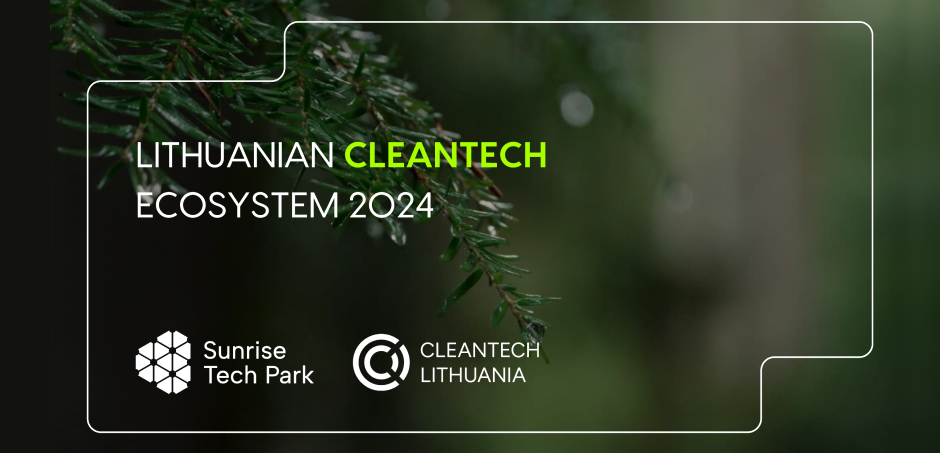
2025-06-10
At the DigiGreen 2025 conference held on June 5, the 2024 Lithuanian Cleantech Sector Overview was presented, highlighting the ecosystem’s rapid growth, increasing investments, and Lithuania’s strengthening role in Europe’s green transition.
The report shows that Lithuania’s cleantech sector has not only expanded in size but has also gained strategic importance for the country’s economy and energy resilience. In 2024, the sector emerged as one of the key drivers of Lithuania’s innovative economy. The ecosystem, which includes over 170 active companies among them 74 startups and 22 scaleups – has outgrown the traditional environmental narrative. Today, it is a mature and economically significant part of Lithuania’s industry, encompassing energy, transport, agriculture, materials, waste management, and other related sectors.
The year 2024 once again proves that the cleantech sector is no longer a niche – it is becoming a central pillar of Lithuania’s innovation and economic strategy. Our companies are not only tackling the challenges of climate change, but also strengthening industry, creating high-value jobs, and boosting resilience in uncertain times. This year’s progress shows that Lithuania is ready not just to participate, but to lead Europe’s green transformation,” says Laima Balčiūnė, Head of Sunrise Tech Park and Founder of Cleantech Lithuania.
The key trend of 2024 is growth driven by sector diversification. While the energy sector continues to lead the way (with over 85 companies), increasing capital and technological advancements are also evident in waste management, transportation, circular economy, and materials. In total, €140.5 million was invested in the sector in 2024 – €107.4 million from public funds and an additional €33.1 million from private investors. Among the most notable deals were a €100 million investment in Green Genius by the EBRD and a €20 million investment in Ovoko, reflecting growing confidence in the potential of Lithuanian companies to become regional leaders.
Investment growth is accompanied by a strengthening labor market. The cleantech sector employs around 8,000 people an increase of 5.6% compared to 2023. The average gross monthly salary has risen to €3,193, which is 44% higher than the national average. In Vilnius, it reaches as high as €3,678. This rise in wages reflects a growing demand for qualified professionals. The need for skilled labor is closely tied to the sector’s increasing economic significance: in 2023 alone, total revenue exceeded €3.05 billion, while taxes paid amounted to €482.7 million, accounting for at least 3% of all national income.
Sectoral data indicates qualitative growth. In the energy sector, salaries have reached €3,422, and the number of companies continues to rise. An even more impressive breakthrough is observed in the resources and environment sector, where the amount of taxes paid has doubled – from €11.2 million to €23.7 million. The transport and logistics sector, with 21 companies and €5.3 million in investments, is becoming a key player in the fight against emissions, particularly in the area of urban mobility. While the agri-food and green materials sectors are still smaller in terms of total value generated, they are giving rise to a new generation of technological solutions that are important for the entire EU.
Geographically, the sector is concentrated in Vilnius, which is home to 55% of all companies, while Kaunas accounts for 22.5% of the market. Startups and rapidly growing scale-ups employ around 3,600 people. Moreover, Cleantech remains one of the most attractive sectors for investors accounting for 25.9% of all investments in Lithuanian startups in 2024. All of this points to the systematic growth and maturity of the ecosystem. Lithuania has already positioned itself as an active player in the European Green Deal. This is evidenced not only by record-breaking institutional investments €233 million from the EBRD (95% allocated to green projects) and €449 million from the European Investment Bank (EIB), but also by the transformative impact these funds enable.
Behind these numbers lies a significant impact on decarbonisation. The EBRD invested €100 million in Green Genius to support the company’s expansion in the Baltic region and the development of new renewable energy capacity. It also allocated €40 million to Vilnius public transport for the purchase of 73 electric trolleybuses and 85 electric buses – an important step toward cleaner urban mobility. An additional €25 million was directed to Šiaulių Bankas’ energy efficiency fund, which finances the renovation of apartment buildings and the decarbonisation of Vilnius’ building stock.
Another example is the EBRD’s investment in EV charging station operator Eldrive, which led to the opening of Lithuania’s first electric vehicle park of its kind in Panevėžys.
Meanwhile, EIB loans have helped drive progress toward securing energy independence. A €105 million loan was allocated for the expansion of the Kruonis Pumped Storage Plant – one of the largest energy storage infrastructure initiatives in Europe. This project will support Lithuania’s goal of reaching 100% renewable energy by 2030. Another €100 million loan granted to the national rail operator LTG Link will allow the replacement of one-third of its fleet with electric and battery-powered trains, helping to reduce CO₂ emissions and shorten travel times. In addition, a €35 million loan was signed with the company Kauno Energija to modernize the city’s district heating system, install thermal storage tanks, and integrate renewable energy sources.
These investments not only reflect significant financial commitment but also deliver real impact from cleaner energy and more efficient transportation solutions to upgraded infrastructure. They are transforming Lithuanian cities, strengthening energy independence, and accelerating the transition to a climate-neutral economy.
As Lithuania moves toward its 2050 climate neutrality goal, it already has a solid foundation and all the necessary tools to become not only a regional leader but also a hub for clean technology innovation – a sector shaping both the technological and strategic future.